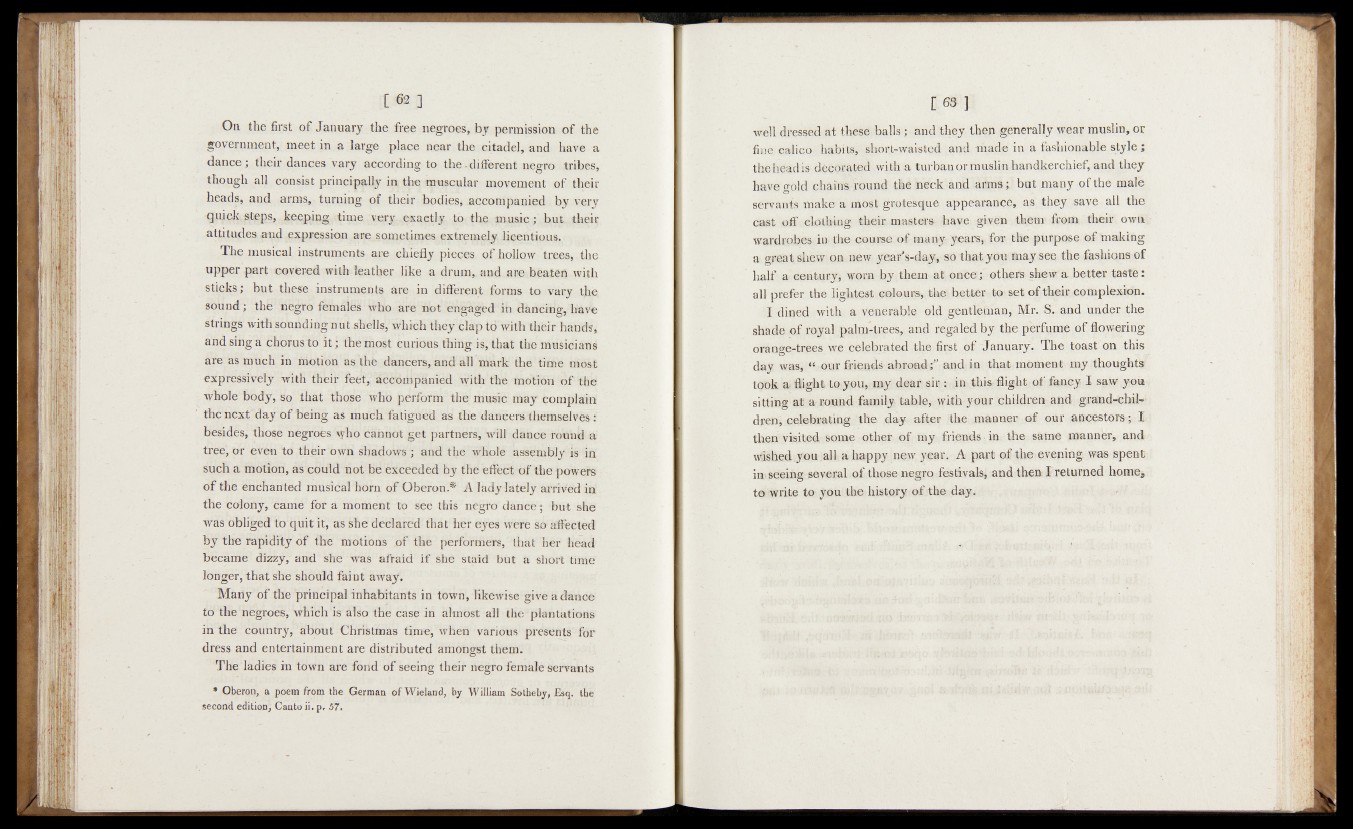
t m 3
On the first of January the free negroes, by permission of the
government, meet in a large place near the citadel, and have a
dance ; their dances vary according to the ..different negro .tribes,
though all consist principally in the muscular movement of their
heads, and arms, turning of their bodies, accompanied. by very
very exactly to the music; hut their
attitudes and expression are sometimes extremely licentious.
The musical instruments are chiefly pieces of hollow trees, the
upper part covered with leather like a drum, and are beaten with
sticks; but these instruments arc in different forms to vary tjhe
sound ; the négro femâlbs who are not engaged in dâncirig, have
strings with sounding nnt shells, which they clap to with their hand«,
and sing a Chorus to it; the most curious thing is, that the musicians
are as much in motion as ’thfe dancers, and all mark the time mOM
expressively with their feet, accompanied with the motion of the
whole body, iso that those who perform the music may complain
the next day of being as much fatigued as the dancers themselves :
besides, those nègroes *$ho cannot get partners, will dance round a
tree, or even to their own shadows ; and the: whole assembly is in
such a motion, as could mot be exceeded by the effect of the powers
of the enchanted musical horn of Oberon.* A lady lately arrived in
the colony, came for a moment to See this negro daneé* but she
was obliged to quit it, as She declared that her eyes were sbaflfectéd:
by the rapidity of the motions pf the performers, that her head
became dizky,' and she was afraid if she staid but a short time
longer, that she should faint away.
Maiiy of the principal inhabitants in town, likewise give a dance
to the negroes, which is al^o the case in almost all the plantations
in the country, about Christmas time, when various presents for
dress and entertainment are distributed amongst them.
The ladies in town are fond of seeing their negro female servants
* Oberon, a poem from the German ofWieland, by William Sotbeby, Esq. the
second edition; Canto ii. p, 57.
well dressed at these,balls; and.’they then generally wear muslin, or
fine calico« habits, short-waisted ,and made in a fashionable style;
the head is decorated with a turban or muslin handkerchief, and they
have gpld chain's-jound the neck, and arans;. but many .of the male
servants make a moat grotesque appearance, as they .save all the
cast off clothing their mastepshave gj^en thenr ftom their owii|
wardrobes in. the course of man»y: years;, for tlie purpose of making
a gjsea t A a r oa new yeur’s-day* so thaf you may see the fashipnenof
half aGeefcoty; worn by them at once; others shew a be tter tastfe:
all prefer the lightest
I dined with a venerable old gentleman, Mr. S. and under the
shade o f royal palm-trees, and regaled by the perfume o f flowering
orange-trees we celebrated the. first o f January; The toasjt'on this
day was, “ our friends abroad;”: and; in that moment sHWlthought»'
took a fl%ht t@4you,in^! doah#%|: inKtkisfflightof fancy I you
sitting at a Bopnd family table, with yetir 'ohMdreh>an&fgraindHehib-
djjebi eefebBating. tho cUwjjr after dm; manner o f ©Ur ancestors^;; X
then VisitecL-rsome «other o f my; friends in; the same manner, and
wished you.all a happyjn&w; year. A part ^ the? evening wns spent
seeing several, of those negro festivals* and thea ! returned home*
to write to you. the history of ihe day.